Section Branding
Header Content
'This should not have happened.' Rockdale County residents rally for change after BioLab fire
Primary Content
Community organizers, speakers and residents affected by the Sept. 29 fire at the BioLab plant in Rockdale County packed into The Movement Church in Conyers on Tuesday night to discuss what comes next for their community more than two months after a chemical plume was released into the air by the fire.
"It's wonderful to see so many people here,” said Ifat Walker, founder of the local group Community Action Now. “Of course, we should not be here, quite honestly, because this should not have happened in the first place.”
The Shutdown BioLab Coalition, which is made up of a number of local and statewide organizations, were joined by residents of East Palestine, Ohio — where a train derailment in 2023 involving Atlanta-based Norfolk Southern released toxic chemicals into that community. The groups also announced Rockdale County’s admission to the Chemically Impacted Communities Coalition, a newly formed group described as a network of 35 communities affected by corporate chemical disasters.
The coalition aims to leverage the experiences and expertise of impacted communities to advocate for stronger safety regulations, improved emergency response protocols, and increased accountability from corporations and government agencies during chemical disasters.
“I think being around people that have been in similar situations make you realize that 1) you're not crazy; 2) you're not alone,” said Jami Wallace, a resident of East Palestine and President of the Unity Council for the East Palestine Train Derailment.
A key concern among county residents is the lack of communication and transparency from both BioLab and government officials. Residents reported not receiving adequate or timely information about evacuation procedures, or the potential health impacts of exposure. Speakers at the event called for renewed focus on reactivating Local Emergency Planning Committees (LEPCs), which could improve preparedness and response for chemical disasters.
Cheryl Garcia, a retired nurse practitioner and Rockdale resident, explained that although she and her family signed up for Rockdale County’s emergency notification system, they received no warning about the fire at BioLab.
"There needs to be local protocols that include immediate notification of residents when there are fires involving potential chemical exposures," Garcia said.
The continued economic impact of the fire on local businesses is also a major concern. Many businesses were forced to close for weeks, and some have not been able to fully reopen.
Larry Cox, vice president of Dan-Kel Concrete Cutting and an incoming member of the Rockdale County Board of Education, was forced to relocate his business near BioLab out of the county because of the fire. While he’s been able to continue operating, he says others have not been as lucky.
“I had neighbors who did zero amount of business for three weeks,” Cox said. "People are afraid to come [to] that region of Rockdale County because they don't know what's going to happen to them."
The community is also calling for greater accountability from BioLab and government agencies in protecting public health and safety.
The U.S. Chemical Safety and Hazard Investigation Board (CSB), a nonregulatory federal agency, published an initial report from their investigation into the fire last month. Investigators called the incident “completely unacceptable,” citing the need for stricter safety protocols for handling hazardous materials. BioLab has said it is cooperating with the investigation.
The facility in Conyers partially reopened in November, although manufacturing has not resumed at the plant.
















